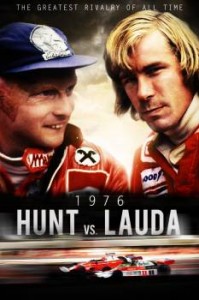1976: Hunt vs. Lauda
Posted on January 7, 2014 at 5:00 am
 Ron Howard’s “Rush” was the story of the Formula One rivalry between the reckless and handsome James Hunt from Great Britain and the cool, hyper-rational Niki Lauda from Austria. In the extraordinary season of 1976, Lauda was in a terrible racing accident, with burns and injuries so severe he was read the last rites. But he was back on the racetrack 42 days later. The parts of that movie that were the hardest to believe were the parts that really happened. And now, a very fine documentary, 1976: Hunt vs Lauda
Ron Howard’s “Rush” was the story of the Formula One rivalry between the reckless and handsome James Hunt from Great Britain and the cool, hyper-rational Niki Lauda from Austria. In the extraordinary season of 1976, Lauda was in a terrible racing accident, with burns and injuries so severe he was read the last rites. But he was back on the racetrack 42 days later. The parts of that movie that were the hardest to believe were the parts that really happened. And now, a very fine documentary, 1976: Hunt vs Lauda, lets the people who were there tell the story.
Grittier than the Hollywood version but with the perspective of those who have had some time to think about what happened, this is a fascinating look at two men who had utterly different personalities but were alike in the single most important aspect of their characters — their love for going faster than anyone else was so profound that they were not only willing to risk death to win the race; they positively relished it. Just as interesting are the men who sponsored them. It is one thing to risk your own life. It is another to urge someone else to risk his. There is a chilling moment when the Ferrari team manager says crisply, “If Niki will not drive, Ferrari will not stop….A driver is very much replaceable.” The team managers are as important a part of the story as the drivers and the allegations of activities that may not constitute cheating but still qualify as unfair. Lauda, his face scarred and his head turned away to hide the damaged ear, is frank about the moment when even his nerves of steel wavered for a moment. He tells the story of a man who asked him for the last autograph he gave before his crash. But there was something unusual about the request — he wanted Lauda to add the date “because it could be the last one.” So, it is the audience as well as the managers and the advertisers and the drivers who are a part of this system.
Parents should know that this is the real-life story of one man who relished the excess of the 70’s, with lots of girls and substance abuse and another who survived a catastrophic racing accident. The film includes some graphic images of the crash and the driver’s injuries.
Family discussion: How does this version differ from the feature film? What makes someone want to race? Do you agree with Lauda’s decision? Should they change the rules to make racing safer?
If you like this, try: “Rush” and car racing films like “Le Mans” and “Heart Like a Wheel’
